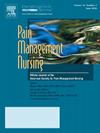The Power of Reiki: Its Effects on Pain and Biochemical Parameters in Patients Undergoing Bone Marrow Transplantation: A Randomized Prospective Controlled Study
IF 2.1
4区 医学
Q2 NURSING
引用次数: 0
Abstract
Purpose
This study aimed to determine the effects of Reiki on pain and biochemical parameters in patients undergoing bone marrow transplantation.
Design
This research was a single-blind, repeated measures, randomized prospective controlled study.
Method
This study was conducted between August 2022 and April 2023 with patients who underwent autologous in the bone marrow transplantation (BMT) unit. In the Reiki group (n = 21), Reiki therapy was applied directly to the energy centers for 30 min on the 0th and 1st day of BMT, and from a distance for 30 min on the 2nd day. No intervention was performed on the control group (n = 21). Data were collected using the Personal Information Form, Visual Analog Scale (VAS), and biochemical parameters. Pain and biochemical parameters were evaluated on days 0, 1, 2, and 10 before the Reiki application.
Result
There were no statistically significant differences in pain scores between the groups before the intervention (p > .005). The Reiki group showed a significant improvement in the mean VAS score compared with the control group on days 1 and 2 (p = .002; p < .001, respectively). The measurement of procalcitonin showed a decrease in the Reiki group and an increase in the control group (p = .026, p = .001, p < .001, respectively). Although the Reiki group had better absolute neutrophil, thrombocyte, and C-reactive protein values than the control group, no significant difference was observed between the groups (p > .05).
Conclusion
Reiki is effective for pain control and enhancing the immune system response.
灵气的力量:灵气对骨髓移植患者疼痛和生化指标的影响:随机前瞻性对照研究
目的:本研究旨在确定灵气对骨髓移植患者疼痛和生化指标的影响:本研究为单盲、重复测量、随机前瞻性对照研究:本研究于 2022 年 8 月至 2023 年 4 月期间进行,对象是在骨髓移植(BMT)病房接受自体骨髓移植的患者。灵气治疗组(n = 21)在骨髓移植的第 0 天和第 1 天直接对能量中心进行 30 分钟的灵气治疗,在第 2 天进行 30 分钟的远距离灵气治疗。对照组(21 人)未进行干预。使用个人信息表、视觉模拟量表(VAS)和生化指标收集数据。在使用灵气疗法前的第 0、1、2 和 10 天对疼痛和生化指标进行评估:结果:干预前,各组疼痛评分差异无统计学意义(P > .005)。与对照组相比,灵气组在第 1 天和第 2 天的平均 VAS 评分有明显改善(p = .002; p < .001)。降钙素原的测量结果显示,灵气组的降钙素原有所下降,而对照组则有所上升(分别为 p = .026、p = .001、p < .001)。虽然灵气治疗组的中性粒细胞、血小板和 C 反应蛋白绝对值优于对照组,但两组间未观察到显著差异(p > .05):灵气疗法可有效控制疼痛并增强免疫系统反应。
本文章由计算机程序翻译,如有差异,请以英文原文为准。
求助全文
约1分钟内获得全文
求助全文
来源期刊

Pain Management Nursing
医学-护理
CiteScore
3.00
自引率
5.90%
发文量
187
审稿时长
>12 weeks
期刊介绍:
This peer-reviewed journal offers a unique focus on the realm of pain management as it applies to nursing. Original and review articles from experts in the field offer key insights in the areas of clinical practice, advocacy, education, administration, and research. Additional features include practice guidelines and pharmacology updates.
 求助内容:
求助内容: 应助结果提醒方式:
应助结果提醒方式:


